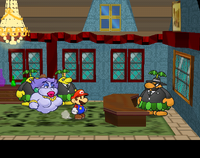Don Pianta: Difference between revisions
Trig Jegman (talk | contribs) mNo edit summary |
(there are a lot of piantas with mustaches with glasses and hats in Sunshine.) |
||
| Line 33: | Line 33: | ||
*Don Pianta resembles the classical Italian mob boss ''The Godfather'', referred to as "The Don". | *Don Pianta resembles the classical Italian mob boss ''The Godfather'', referred to as "The Don". | ||
**In addition, Don Pianta's anger at his daughter and right-hand getting married and sending them away, and later suffering an illness caused by depression regarding their departure, are based on one of the first talking films, ''The Jazz Singer''. | **In addition, Don Pianta's anger at his daughter and right-hand getting married and sending them away, and later suffering an illness caused by depression regarding their departure, are based on one of the first talking films, ''The Jazz Singer''. | ||
{{Piantas}} | {{Piantas}} | ||
Revision as of 16:32, September 13, 2020
- “I'm Don Pianta! I make cryin' babies weep!”
- —Don Pianta, Paper Mario: The Thousand-Year Door
Don Pianta, also known as the Don of Untimely Death, is the boss of the Pianta Syndicate as well as ruler of the West Side of Rogueport. Don is the father of Francesca and the rival of Ishnail. His skin is orange, he has a mustache, and he wears a dark suit, dark sunglasses, and a gangster-style fedora in addition to the traditional Pianta hula-skirt. Like all stereotypical gangsters, Don Pianta speaks with a Brooklyn accent. This trait is shared with Rocko and Ishnail.
Mario must visit him in order to acquire tickets to the Cheep-Cheep Blimp, in order to reach his destination, Glitzville. Don Pianta agrees to supply Mario with the tickets needed under one condition, that he find his missing daughter and his most trusted henchman Frankie, who have eloped. After Mario locates them at the docks, Frankie and Francesca confront the mob boss. Through Mario's intervention, Don Pianta gives the couple his approval, and rewards Mario and co. with the tickets he promised.
He soon falls ill however; he misses his daughter so much, he becomes sick with grief. He is revisited by Mario who is, once again, looking to gain a ticket, this time for the Excess Express in order to reach Poshley Heights. Vinny and Tony promise Mario tickets, if he can find and return Francesca. Mario travels to Keelhaul Key, and after notifying Francesca of her father's condition, she returns with Frankie in tow. Upon the arrival of his daughter, Don Pianta instantly recovers and comes to the realization that his job as boss of the Pianta Syndicate is too stressful and passes the leadership on to his daughter and son-in-law, and retires. He then awards Mario with tickets to the Excess Express. Afterwards, he remains in the Pianta Parlor for the rest of the game.
Tattle information
- That's the boss, Don Pianta. It's true what they say about power: this guy's got POISE. But he's got a mean streak a mile wide... They call him "The Don of Untimely Death." Still, he's got a really soft spot for his daughter, Francesca...
- (After his retirement) That's Don Pianta, the former syndicate boss. He's retired now, but he's still a force. He must be here because he's all worried about Frankie and Francesca, huh? Or... maybe he's just worried that Francesca's cracking the whip on poor old Frankie!
Names in other languages
| Language | Name | Meaning | Notes |
|---|---|---|---|
| German | Al Palmone[?] | Portmanteau of Palma, the German name for the Piantas, and "Al Capone" or "Don Corleone". | |
| Italian | Don Malapalma[?] | Mala means "organized crime", palma is from Palmense (Italian for Pianta) | |
| Spanish | Forestone[?] | From Foresto (Spanish name for Piantas) and from "Al Capone" or "Don Corleone". |
Trivia
- Don Pianta resembles the classical Italian mob boss The Godfather, referred to as "The Don".
- In addition, Don Pianta's anger at his daughter and right-hand getting married and sending them away, and later suffering an illness caused by depression regarding their departure, are based on one of the first talking films, The Jazz Singer.
